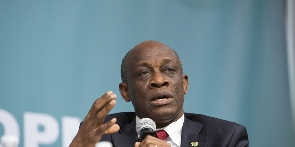 Seth Terkper, former Finance Minister
Seth Terkper, former Finance Minister
Former Finance Minister Seth Terkper has said that the expenditure related to the coronavirus pandemic should not be solely considered as responsible for the widening fiscal deficit but rather what is driving the debt is the funds used to resolve financial institutions and energy sector debt which were excluded in the 2020 budget.
His comments come after the current Finance Minister, Ken Ofori-Atta said in his Mid-year Budget presentation in parliament that the expenses related to the coronavirus pandemic and its impact on revenue generation has shot the fiscal deficit figure to 11.4 percent against a pre-pandemic target of 4.7 percent, necessitating the request of an extra GH¢11.8 billion to close the yawning gap.
According to Mr. Terkper, government wants to take advantage of the pandemic-induced spending to cover up the true picture of the economy which has always shown that the deficit figures are far higher than what has always been presented in the budget due to expenditure related to the financial sector bailout and energy sector debt.
“If you exclude the energy sector cost and the banks’ bailout cost from the 2020 budget and you are now including them in the revised budget line, obviously they will increase the deficit but that has nothing to do with COVID. This is because the government understated and suppressed those figures before COVID.
And that is why we are saying that they should separate the COVID cost which is about 2 to 3 percent of GDP. The two major costs that are contributing to the deficit is the banks’ bailout cost and the energy sector cost but not the COVID cost,” he said in an interview with the B&FT.
A critical analysis of the budget indicates that the deficit figure of 11.4 percent excludes both the energy sector cost of GH¢2.6 billion and the GH¢15.7 billion bailout cost for banks. Added, it takes the overall deficit figure to 13.6 percent of GDP and not 11.4 percent.
This, Mr. Terkper says was done deliberately by the government to portray that it is managing the economy well and to force it to bring the deficit figures to the fiscal rule limit of 5 percent before the pandemic.
“What we are saying in essence is that the headline figures that were projected even in the mid-year budget review were grossly understated and we can see this when you analyse the appendix in the budget. We are highlighting the fact that the deficit is higher than what has been put out.
We think there are two primary reasons for doing this. One is that the government wants to impress rather than actually showing results. Because if you exclude the energy sector and banking cost and show them at the footnote, then you give the impression that you are performing very well which in actual fact you are not.
The second reason why we think they are doing this is to force and remain below the 5 percent Fiscal Responsibility Act to create the impression that they are within the limit where in actual fact they are above. So we are telling Ghanaians not to be fooled by those figures,” he said.